
Each year the seven departments of the UCLA Samueli School of Engineering, and the school as a whole, bestow honors on graduating students who have had distinguished accomplishments and made special contributions. Below are short Q&A’s with this year’s school-wide winners.
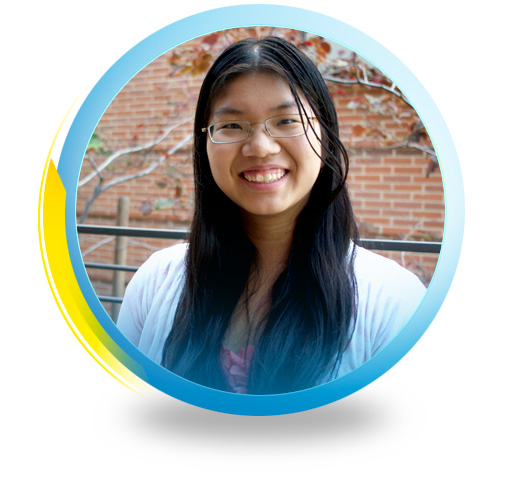
Alice Tang
2018 Outstanding Bachelor of Science Award
Alice Tang, graduating with a bachelor’s degree in bioengineering, is the school’s 2018 Outstanding Student Award winner at commencement. In the fall she will begin an M.D./Ph.D. program at UC San Francisco.
Q&A
What was your favorite class at UCLA and why?
This is a hard question as I have many. BE100, Bioengineering Fundamentals with Professor Daniel Kamei, was the first class where I feel in love synthesizing our broad knowledge into applications like understanding drugs and treatments. Then classes like BE 260, Neuroengineering with Professor Wentai Liu, was a class where I enjoyed the other side of the spectrum with understanding devices and signal processing, while listening to interesting research talks about current applications in the field! For me, the beauty of bioengineering is that there is the freedom to be broad, while we master the dexterity needed to interface across engineering, sciences, and communications into important applications that can impact the world.
What was your favorite UCLA memory?
My favorite UCLA memories are from moments of bonding as a community. Moments like working late and talking about radios in the ELFIN (Electron Losses and Fields Investigation) satellite team, inspiring freshman to love science and research through the URC (Undergraduate Research Center)-Sciences, sharing background stories with the members in my lab.
Were you part of a research lab? If so, what did you do?
Yes! I worked in the Neurovascular Imaging Research Core Lab with Dr. Fabien Scalzo. I worked on projects that involve developing algorithms for medical image analysis, for applications like co-registration of images and providing quantitative metrics to evaluate neurovascular treatments.
What are your plans after graduation?
I plan to pursue a combined M.D. and Ph.D. degree program at UC San Francisco! As a physician-scientist, I can continue my love of bioengineering and work at the intersection between scientific advances and medicine to develop new therapies and treatments.
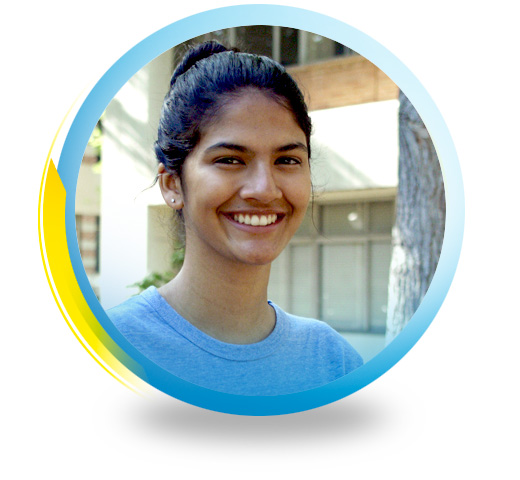
Apurva Panse
Russell R. O’Neill Distinguished Service Award, 2018 UCLA Chancellor’s Service Award
Apurva Panse, graduating with a bachelor’s degree in computer science, is the school’s 2018 Russell R. O’Neill Distinguished Service Award Winner. She also received a 2018 Chancellor’s Service Award. After graduation, she’ll join Google as an associate product manager.
Q&A
What was your favorite class at UCLA and why?
This winter, I took a course titled Science, Technology and Public Policy with Professor (John) Villasenor and Professor (Albert) Carnesale. The class taught us the policy and legal implications behind emerging technologies like driverless cars, net neutrality, cybersecurity and digital privacy. Learning about the interdisciplinary nature of engineering motivated me to consider law school as a potential career path.
You’ve been part of “<Teach LA>”, can you talk a little bit about it, and what was the motivation for forming it?
<Teach LA> is an organization that connects UCLA undergraduates with schools in Los Angeles that want to teach computer science, but do not have the resources to do so. Currently only seven out of fifty states in America have K-12 computer science standards, and less than 10 percent of American high schools offer AP computer science. Technology literacy can empower students, and as UCLA students, we have an obligation to help our own community. Since its inception, <Teach LA> has taught more than 100 students how to code!
You were also involved with Girls Who Code. Can you tell us more about it and what you did as a part the organization?
Girls Who Code is a national organization with the mission to end the gender gap in technology. I have been an instructor at the Lincoln Middle School Girls Who Code club for the past three years. Every Thursday I taught a group of middle school girls how to code. Together, we learned about emerging technologies, researched inspiring computer scientists, built websites and visited large tech companies like Oracle and Google!
Were you part of other student organizations? Did you conduct undergraduate research?
At UCLA, I helped establish the learning assistant program in the computer science department, and served as a Head LA for three quarters. Learning assistants are undergraduate students who help facilitate active learning and collaborative instruction in classes that they have previously taken and succeeded in. Additionally, I was on board for ACM and ACM-W; the former is the largest computer science organization on campus. This year, I joined Camp Kesem as a counselor. Kesem is a national organization that supports children through and beyond their parent’s cancer. As a counselor, I help put on a free week-long camp for kids.
- What are your plans after graduation?
After graduation, I will be joining Google in Mountain View as an Associate Product Manager. A couple of years down the road, I hope to go to law school and work on issues at the intersection between policy and technology.
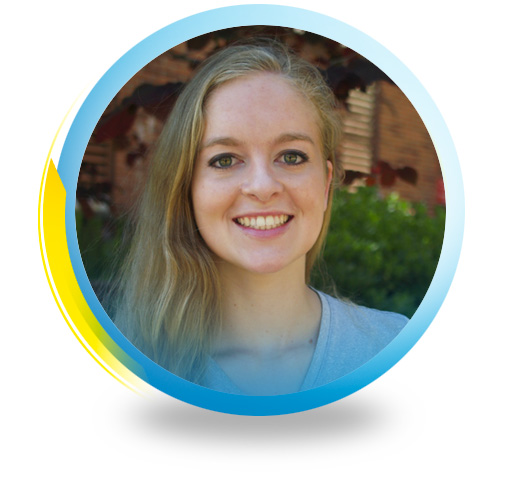
Ellen Key
2018 UCLA Chancellor’s Service Award
Ellen Key, graduating with a bachelor’s degree in civil engineering, is a recipient of the UCLA Chancellor’s Service Award. In the fall, she moves to Portugal for graduate study at the University of Minho.
Q&A
What was your favorite class at UCLA and why?
My favorite class was Introduction to Architecture, which allowed me to learn a little about art, architecture, and urban planning. We studied the influences that society and art has had on architecture, which I could in turn relate to civil engineering.
You’ve been involved in Engineers Without Borders (EWB) for while, including as its president this year. Can you tell us, just briefly, about the project/s the organization spearheaded? And more importantly, why this organization really clicked w/ you?
I chose EWB because I love combining my passions, so humanitarian engineering work allowed me to help others and learn about the world while implementing structural design concepts I had learned in class. As president this year, I was able to mentor undergraduates of many different majors, while overseeing our three projects. These projects include installing single-home pressurized water systems in the Navajo Nation in Arizona, constructing a schoolhouse in San Sebastián, Nicaragua, and creating a library for the Sm’echa-Zala community in Ethiopia.
- You were part of other volunteer organizations as well during your college career, what were those?
I was a participant, site leader and board member of Alternative Break. During my second year, I worked to vitalize the community of New Orleans, Louisiana by reconstructing old homes and serving the homeless. Last year, I organized a one-week community service trip during spring break to Channel Islands National Park to restore trails and remove invasive plant species. Now as a board member, I provide guidance to site leaders, plan fundraisers, improve member retention, and assist in budgeting.
I was part of Hunger Project at UCLA for four years. This included site visits to distribute food on Skid Row, mentoring underserved children, and cooking meals at homeless shelters.
I was also a camp counselor for UCLA Unicamp for three years. I mentored middle and high school-age youths at a week-long summer camp. I taught science and engineering at my rotation, such as how to improve the structural stability of towers made of dry spaghetti noodles. Last year and this year, I am part of the Village Session, which works with the local organization The Village Nation to empower black youths.
More broadly, how did service become an important part of your undergrad experience?
I’ve grown up doing community service (I’ve been a Girl Scout since I was six), so I knew I wanted to continue to perform community service in college. I had the opportunity to learn about social justice and even study the broader implications of service work in society, and the complexity of it fascinated me. Plus, the friends I have made in service organizations are some of my dearest friends. I found a lot of organizations I am very passionate about on campus, so it’s been easy and fun to get involved.
What are your plans after graduation?
In the fall I will start the advanced master’s program in Structural Analysis of Monuments and Historical Constructions at the University of Minho, Portugal.
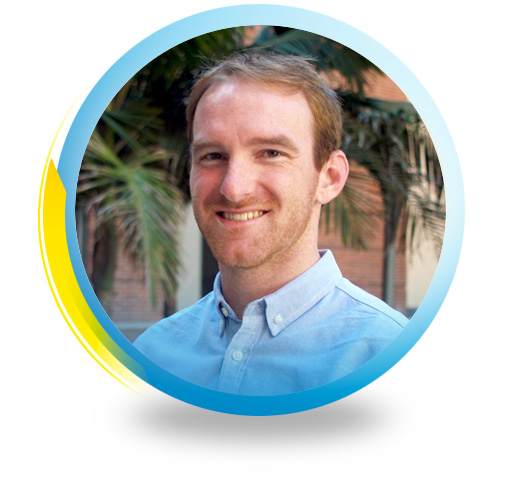
Brendon Anderson
2018 Harry M. Showman Prize undergraduate student
Brendon Anderson, who graduated with a degree in mechanical engineering earlier this year, is the undergraduate winner of the school’s Harry M. Showman prize, which honors research accomplishments. In the fall, he’ll begin a graduate program at UC Berkeley.
Q&A
What was your favorite class at UCLA and why?
My favorite class at UCLA was MAE 270A. Among other topics, we learned how to analyze the stability, observability, and controllability of linear dynamical systems. Much of the material covered was mathematically abstract, and the proofs on homework assignments and exams motivated critical thinking. The problems felt almost like riddles, which made the assignments very engaging and enjoyable. The course also had a project in which we performed system identification and analysis of a multi-input, multi-output system using actual impulse response data. Aside from the interesting subject matter, Professor Robert M’Closkey made the class truly wonderful. He is an incredible lecturer and his notes provide a thorough presentation of the course material. Other courses that I enjoyed include Professor Tsu-Chin Tsao’s MAE 171B class on digital control and MAE 181A, on complex analysis, with Dr. Himadri Samajder.
Can you explain the research you worked on in general terms?
I worked in the Applied Math Lab under professors Matt Haberland, Olga Turanova, and Andrea Bertozzi, the P.I. of the lab. We studied methods for controlling robotic swarms to distribute themselves spatially according to a desired pattern. We primarily worked with decentralized control algorithms in which the individual robots have no localization or communication capabilities, but only have access to a locally measured value of interest. One application of these kinds of algorithms might be the pollination of crops by a swarm of robotic bees.
I’ve also been working on a project with Professor M’Closkey for the past few months. In this project, I’ve been designing, manufacturing, and testing low-frequency monolithic accelerometers for use in the MAE department’s dynamic systems and control laboratories. This has been a really fun process, as I’ve gotten a chance to gain some hands-on experience and learn how to use new tools, like COMSOL for simulations and wire electrical discharge machining for fabrication.
How did you get interested in research in the first place?
I would say my interest in research was initiated by some of the work I did for the Baja SAE racing team here at UCLA. Our team had been using a pre-made continuously variable transmission (CVT) in our vehicles for years, but we didn’t have a good idea of how its complicated mechanisms work. I saw this as an intriguing open problem, so after some consultation with an alumnus, I worked on deriving an accurate mathematical model of the CVT dynamics then wrote a MATLAB program for computing the optimal flyweight mass to tune the CVT. This experience was filled with research-type tasks, such as reading academic papers on v-belt dynamics, and I quickly began to relish the open-endedness and thrill of this sort of work.
Knowing I love mathematics and was in the market for a job, my friend Rebecca sent me an application link for an open position in the Applied Math Lab, which, after accepting the job, was my first formal research position. I found myself working in the Math Lab from nine to five, then going home just to continue coding or reading papers since I couldn’t stop thinking about the exhilarating problems I faced throughout the day.
What are your general plans after graduation?
This summer I will be going to Portugal to present at the ICINCO conference. After that, I’ll be starting my Ph.D. in August at UC Berkeley doing research at the interface of control theory, optimization, and machine learning. Once I graduate, I’m hoping to find a postdoc position or faculty appointment, since it would not only allow me to continue engaging in research, but also permit me to teach, which I very much enjoy.
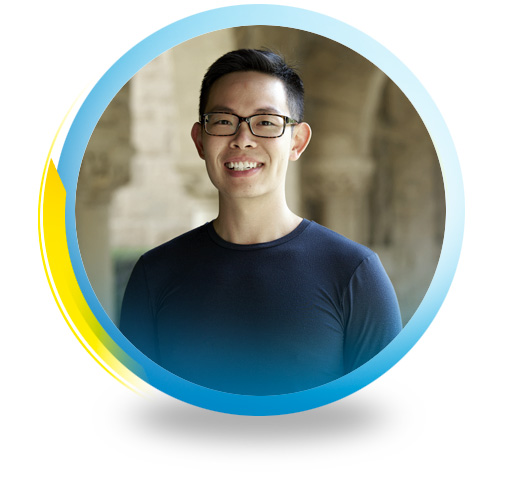
Andy Kah Ping Tay
2018 Showman Prize, graduate student
Andy Kah Ping Tay, who received his Ph.D. in bioengineering, is the graduate student winner of the Harry M. Showman prize, which honors research accomplishments. He is currently a post-doctoral fellow at Stanford University and will join the faculty of the National University of Singapore next year.
Q&A
Can you explain your Ph.D. research in general terms? How could this be applied?
My Ph.D. research focuses on non-invasive magnetic neural modulation. Deep brain stimulation is an FDA-approved treatment for a range of nervous system-related diseases including pain and epilepsy. Unfortunately, for these treatments, patients often need to undergo invasive surgeries to have electrodes implanted into their brains or spinal cords. The surgeries can also lead to chronic inflammation at the site of implantation.
In my research, I developed magnetic hyaluronic acid hydrogels, with my friend, Alireza, that are soft and can be injected into the extracellular spaces of the brain/spinal cord cells (neurons) for non-invasive modulation of their activities. The neurons grow healthily in the hydrogels and can be mechanically stimulated via mechano-sensitive proteins on their membrane.
We found that in vitro chronic modulation of primary rat neurons reduced their expressions of mechano-sensitive proteins, PIEZO2, that are known to contribute to pain. We hope to test this system next in in vivo models to see if the results still hold.
What appealed to you about pursuing your doctorate at UCLA?
I was offered Ph.D. positions in a few places but I decided to head to UCLA because of my advisor, Dino Di Carlo. As an undergraduate in Singapore, I have read many of his papers and was highly impressed by the quality of his work. It turns out that my choice was right! Dino is extremely open to new ideas and he does not discourage his students from trying out new experiments. I feel that working in the lab has developed a lot of my scientific independence.
Besides my lab, I am also highly drawn to UCLA’s interdisciplinary research culture. For instance, when I needed help with magnetic field measurements, I could seek out colleagues in the earth sciences department. Imagine reading a paper with co-authors in bioengineering, neuroscience and planetary science! UCLA has so many great facilities that it accelerated my work.
Very importantly, I also enjoy how diverse UCLA is. Before coming to UCLA, I have never imagined making good friends from Iran, South Korea, etc. Interactions with my friends have given me a better idea of their cultures, and taught me to interpret world events through different lenses.
How did you get interested in your field?
I feel that my early exposure to research shaped my interest and developed my expertise in biomaterials and mechano-biology. I started as a research intern at the Institute of Bioengineering and Nanotechnology, A*STAR, and developed anti-microbial peptide hydrogels. I then went on study the mechano-biology of malaria-infected red blood cells and circulating tumor cells with Prof CT Lim at the National University of Singapore. These experiences made me love research and wanted a career as a scientist.
When I came to UCLA, I wanted to capitalize on Dino’s expertise in microtechnologies to further understand the mechano-biology of neural networks. Magnetic system is great because it has deep tissue penetration and can be used for both in vitro and in vivo work.
What are your plans after your post-doc?
With the support of Dino and my scholarship mentors in Singapore, I was awarded the National University of Singapore (NUS)-Overseas Postdoctoral Fellowship for my postdoc in Stanford. In 2019/20, I will return to NUS as an assistant professor where I hope to set up my own lab to continue some of the work I have done in UCLA and Stanford.
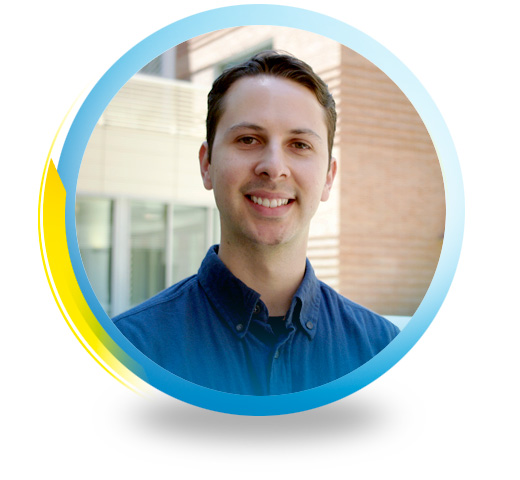
Gerardo Franco
2018 Student Speaker
Gerardo Franco, who is graduating with a master’s degree in mechanical engineering, is the 2018 student speaker at commencement. Franco earned his bachelor’s degree last year from the school. After graduation, he will join Raytheon as a mechanical engineer to work on satellites.
Q&A
Can you tell us a little bit about your speech?
The through line of my speech is influence and how we can use influence to bring out the best in others. My speech starts off with recognizing the effort all graduates put forth leading to the day of commencement. Then I introduce three key points that I believe are important takeaways for recent graduates to take with them on their next chapter in life. The three takeaways are striving for personal growth, learning how to use influence, and the importance of seizing opportunity. I packaged these takeaways in three personal stories from my own experience while at UCLA.
What was your favorite (graduate-level) class and why?
Throughout my time at UCLA I didn’t have a favorite class, but I loved how my entire major opened doors for me outside of academia. Majoring in engineering was the best decision I’ve ever made and attending UCLA checked all the boxes I had for my college experience. There are endless career opportunities in Los Angeles and attending UCLA provided a proximity advantage which resulted in interviews with reputable companies.
How did CEED help you, especially in the transition from Cerritos College to UCLA as a junior?
I credit the CEED organization for helping me transition from a community college to the rigorous pace of studying engineering at UCLA. The summer before I transferred I participated in a two-week summer program known as BREES which was organized by CEED to get new students up to speed with the quarter system. BREES took the material taught in the first six weeks and condensed them into an accelerated two-week program. Going through this program allowed me to enter my first quarter with a sense of how to succeed in the fast pace environment of UCLA engineering.
What motivated you to continue to pursue your master’s degree?
A master’s degree for me was an opportunity to dive deeper into the field of mechanical engineering. Very early in my undergraduate years I decided I wanted to grow my engineering toolbox by completing graduate school. I also understood the importance of getting it done sooner rather than later. I knew if I waited to do my master’s, I would not go back to school; a gap year would easily turn into a gap lifetime. This is why I decided to start my master’s immediately after completing my bachelor’s.
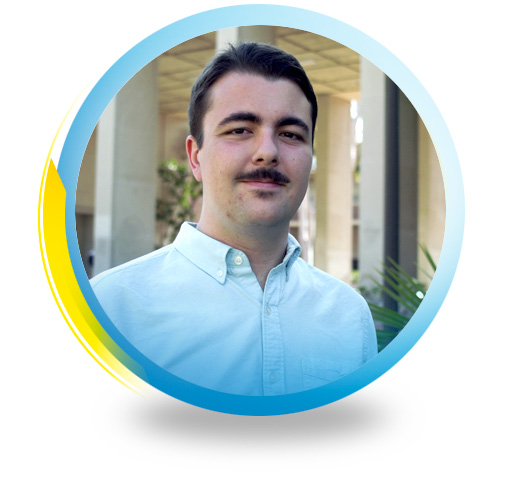
Theodore Allen
2018 National Anthem Vocalist
Theodore Allen, graduating with a bachelor’s degree in mechanical engineering, is the national anthem vocalist at commencement. In fall, he returns to UCLA Samueli to pursue his master’s degree.
Q&A
What was your favorite class at UCLA, and why?
I think my favorite class is probably MAE 294A: Compliant Mechanisms, taught by Professor (Jonathan) Hopkins. I was really interested in the subject matter from taking his mechanisms class before, and I especially liked the visualization challenges that it presented. The class showed how extremely complex kinematic systems could be broken down into very simple building blocks. It’s probably the only class ever that I looked forward to doing the homework for.
How did you become interested in singing? Have you been a part of any performing groups?
I started singing in 3rd grade, when I joined the Ragazzi Boys Chorus, an all-male chorus in the San Francisco Bay Area, which I stayed with until I graduated high school. That’s where I got most of my singing training from. Since coming to UCLA, I’ve briefly been a part of the UCLA Chorale, UCLA chamber singers, an ad hoc choir performing at Kenny Burrell’s birthday concert, and a string quartet. More substantially, I’ve been in the UCLA Symphony for 2 years (playing viola), and am a member of the a cappella group On That Note. I have a special fondness for quartets; I spent the first two years playing in a string quartet, and the past two years singing in a barbershop quartet.
You’ll be singing in Pauley, will this be the biggest crowd you’ve sung in front of before?
Well, yes and no. I have sung the national anthem at a Giants game before, but that was as part of Ragazzi, so I was one of like a hundred people on the field singing. That being said, I think this Commencement is going to set the record for biggest audience I’ve sung for on my own.
What are your plans after graduation?
I’ve decided to continue and pursue a master’s in mechanical engineering, so I’ll be back in the fall.
